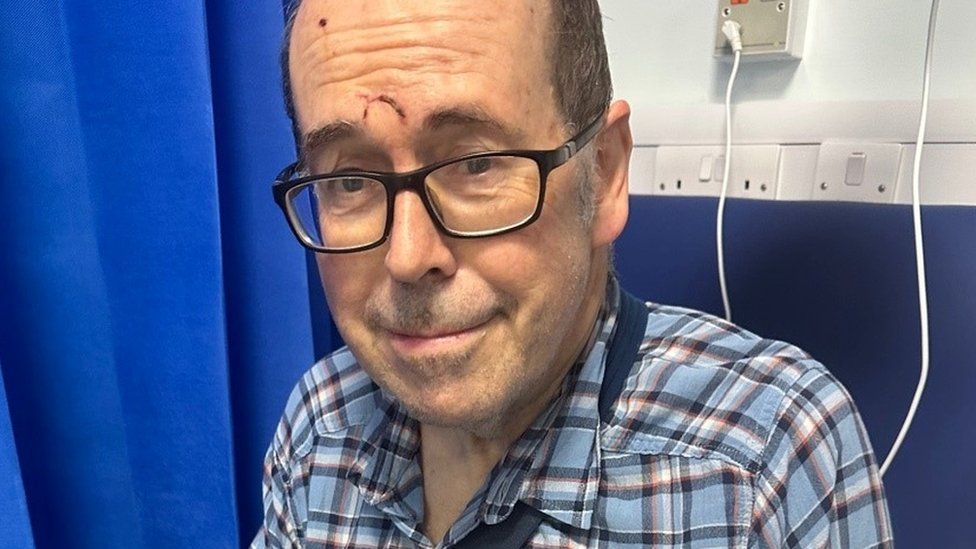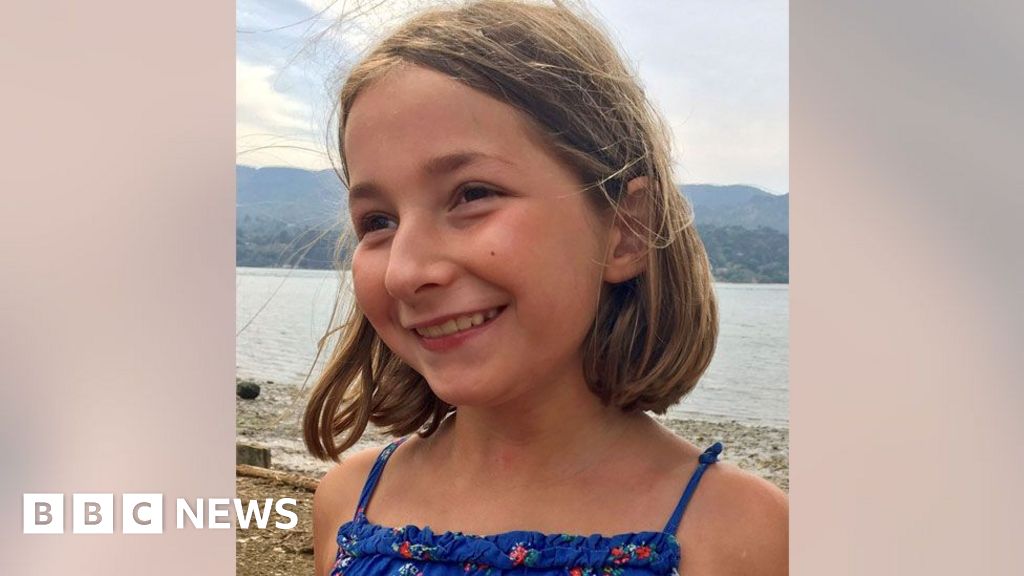ARTICLE AD BOX
 Image source, Rory Cellan-Jones
Image source, Rory Cellan-Jones
Rory was frustrated by doctors and nurses not sharing information or telling him what was going on
Former BBC Technology correspondent Rory Cellan-Jones, now a writer, podcaster and owner of rescue dog Sophie from Romania, has Parkinson's disease. Two weeks ago, after fracturing his elbow in a nasty fall, he found out just how difficult it can be to get answers from the NHS.
Walking down a poorly lit street in heavy rain, I tripped on a branch dislodged by the storm and my face crashed into the pavement. With that, my latest experience of NHS care was under way.
As I stumbled to my feet, blood pouring from my face, I was convinced I had broken my nose. I phoned my wife Diane and she rushed to take me to A&E.
When we saw the triage nurse, the blood pooling on the floor was the first sign of how serious the problem with my elbow was.
I then spent many hours lying on a trolley, waiting for the next stage. The possibility of admission was discussed but I eventually arrived home with my arm in plaster at 03:45 BST.
That weekend, Diane waited on me hand and foot. It was a sobering experience and perhaps a glimpse of my future as Parkinson's gradually makes me less capable of doing things I once took for granted.
From now on, there will be an edge of fear associated with another activity which I never used to think about - going for a walk.
Switchboard hell
The next week, I anxiously awaited a call from Ealing Hospital to tell me when they would be operating on my badly fractured elbow.
One source of the anxiety was the difficulty of contacting anyone at the hospital. Without a name you are lost in switchboard hell, passed from one extension to another as you try to identify the correct department.
A call came on Tuesday to attend a CT scan, which revealed mine was an open fracture, where the bone has pierced the skin - something that should have been noted when I was sent home on Saturday.
The registrar now wanted me to return to the hospital to be admitted, put on an antibiotic drip and prepared for surgery on either Wednesday or Thursday.
Image source, Rory Cellan-Jones
Image caption,Rory was told he had suffered an open fracture and required surgery
At least that sounded like a clear plan of action and when my wife Diane got home, we set off for the hospital.
We arrived at 19:00 under the foolish misapprehension that I would be whisked in and put on that antibiotic drip pronto.
No such luck. It was 21:00 before I was lying on a stretcher with the registrar inspecting my wound and replacing the plaster cast. We were in a cubicle which also housed the linen cupboard so there was a constant stream of medical staff coming through in search of sheets and pillows.
It was 01:00 the following day before they finally found me a bed on a ward.
Blank looks
Now, we all know about the pressures on A&E and the scarcity of beds - and the hard-pressed staff were lovely - so I could accept the long wait. What did worry me was exactly when I was going to be put on the antibiotic drip I had been told was so urgent.
I kept mentioning this to anyone who came near me but got blank looks. After 23:00 I was told I could no longer eat or drink so that I would be ready for surgery in the morning.
Finally, at 03:00 a canula was inserted in my hand and the antibiotics began to flow.
Wednesday morning came after a virtually sleepless night but I felt positive because at last my fracture was going to be sorted out. Or was it?
I kept asking when a decision would be made on my operation but got no answers. Hope began to fade, and then around 10.15 a doctor arrived and seemed surprised that I had ever expected to be heading to theatre - after all, I had only been on the antibiotics for a short while.
I felt a huge sense of anti-climax but at least I could have some breakfast now and I'd be home by Thursday afternoon.
The whole cycle began again - nil by mouth after 23:00, a few hours of fitful sleep, awake at 05.30 eager to go - but with the same result.
At 9.30 I texted Diane: "Still waiting for information. This place is driving me nuts."
Shortly afterwards came confirmation - I had been bumped off the list. A 94-year-old had broken his hip and someone else had been injured in a car accident. It was hard to argue that they should not be given priority in theatre.
Nevertheless, if I'd been kept in back on Saturday I would have been sorted by now.
Fears of decline
My misery plumbed new depths. While my Parkinson's may not have caused my fall, my symptoms were now being exacerbated by the pain and discomfort from my right arm.
Now I feared I would emerge from this ordeal having taken a big step down the Parkinson's ladder of decline.
Until that moment I saw myself as coping well with my Parkinson's and definitely not as an old person. But in the days after the incident I felt 10 years older, shaky, indecisive, a patient waiting to be told what to do rather than a free agent shaping my life.
I explained my fears to those treating me and, to be fair, they appeared to understand. Suddenly I had three doctors and a senior nurse around my bed discussing the options. The decision was made that I should go to a different hospital for an operation on Saturday.
After 36 hours occupying a valuable bed to no purpose, I was released from hospital to go home for the night - although the paperwork for my release took four hours.
Once home, there was more tension. Due to a mishap with passing on my contact details, it took all day Friday to hear about the next step.
But I eventually got the call and the next day I was admitted to Northwick Park Hospital in Harrow.
Image source, Rory Cellan-Jones
Image caption,Rory is reunited with Sophie, his dog, who was rescued from Romania
From then on, everything went smoothly. I was first on the surgery list and woke shortly after 14:00 in some pain but hugely relieved that the job had been done. Eight days after my accident, my recuperation could begin.
I do want to stress that at both hospitals I was treated by excellent staff working under great pressure in difficult circumstances. But what struck me is that the NHS remains a cumbersome beast that struggles to talk to its patients or to itself.
No talking
Getting information about one's treatment seems like an obstacle race where the system is always one step ahead. But communication between medical staff within and between hospitals also appears hopelessly inadequate, with the gulf between doctors and nurses particularly acute.
I also sense that, in some cases, new computer systems are slowing not speeding information through the system. On Saturday morning, as we waited in the surgical assessment unit, four nurses gathered around a computer screen while a fifth explained to them all the steps needed to check-in a patient and get them into a bed. It took about 20 minutes and appeared to be akin to mastering some complex video game beset with bear traps.
One bright spot was the NHS app which was often first with new information, such as my discharge letter, but I still had to wait for it to be printed out before I could go.
I am very grateful that the NHS finally came good and fixed me up and I am slowly getting back my mojo as I prepare for other projects - not least my work with our rescue dog Sophie from Romania, who has been set back in her progress by my inability to work with her.
But my latest experience as a customer of the health service has nevertheless left me convinced that more money and more staff won't solve its problems without some fundamental changes in the way it communicates.
London North West University Healthcare NHS Trust said: "It's clear from Mr Cellan-Jones' recent experience that we must do more to improve the way we communicate with patients who need our trauma service.
"We're always grateful for feedback from our patients and have already arranged to review our trauma pathway at Ealing so we can make improvements to offer as seamless an experience for our patients as possible.
"We wish Mr Cellan-Jones a smooth and swift recovery."

 1 year ago
51
1 year ago
51








 English (US) ·
English (US) ·